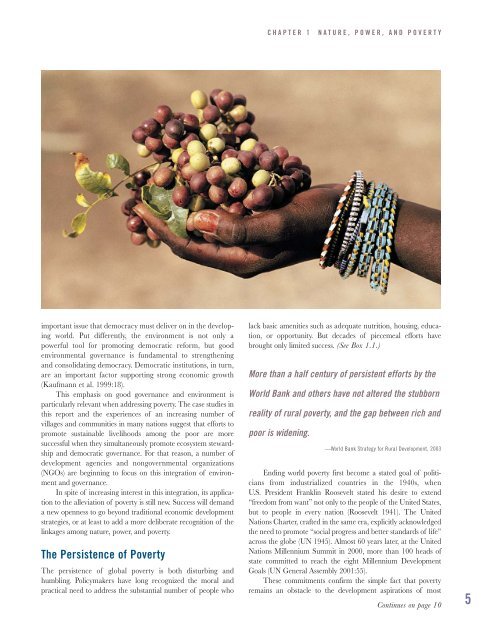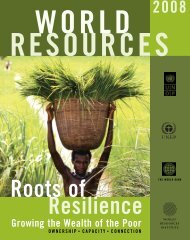jp8589 WRI.qxd - World Resources Institute
jp8589 WRI.qxd - World Resources Institute
jp8589 WRI.qxd - World Resources Institute
You also want an ePaper? Increase the reach of your titles
YUMPU automatically turns print PDFs into web optimized ePapers that Google loves.
CHAPTER 1<br />
NATURE, POWER, AND POVERTY<br />
important issue that democracy must deliver on in the developing<br />
world. Put differently, the environment is not only a<br />
powerful tool for promoting democratic reform, but good<br />
environmental governance is fundamental to strengthening<br />
and consolidating democracy. Democratic institutions, in turn,<br />
are an important factor supporting strong economic growth<br />
(Kaufmann et al. 1999:18).<br />
This emphasis on good governance and environment is<br />
particularly relevant when addressing poverty. The case studies in<br />
this report and the experiences of an increasing number of<br />
villages and communities in many nations suggest that efforts to<br />
promote sustainable livelihoods among the poor are more<br />
successful when they simultaneously promote ecosystem stewardship<br />
and democratic governance. For that reason, a number of<br />
development agencies and nongovernmental organizations<br />
(NGOs) are beginning to focus on this integration of environment<br />
and governance.<br />
In spite of increasing interest in this integration, its application<br />
to the alleviation of poverty is still new. Success will demand<br />
a new openness to go beyond traditional economic development<br />
strategies, or at least to add a more deliberate recognition of the<br />
linkages among nature, power, and poverty.<br />
The Persistence of Poverty<br />
The persistence of global poverty is both disturbing and<br />
humbling. Policymakers have long recognized the moral and<br />
practical need to address the substantial number of people who<br />
lack basic amenities such as adequate nutrition, housing, education,<br />
or opportunity. But decades of piecemeal efforts have<br />
brought only limited success. (See Box 1.1.)<br />
More than a half century of persistent efforts by the<br />
<strong>World</strong> Bank and others have not altered the stubborn<br />
reality of rural poverty, and the gap between rich and<br />
poor is widening.<br />
—<strong>World</strong> Bank Strategy for Rural Development, 2003<br />
Ending world poverty first become a stated goal of politicians<br />
from industrialized countries in the 1940s, when<br />
U.S. President Franklin Roosevelt stated his desire to extend<br />
“freedom from want” not only to the people of the United States,<br />
but to people in every nation (Roosevelt 1941). The United<br />
Nations Charter, crafted in the same era, explicitly acknowledged<br />
the need to promote “social progress and better standards of life”<br />
across the globe (UN 1945). Almost 60 years later, at the United<br />
Nations Millennium Summit in 2000, more than 100 heads of<br />
state committed to reach the eight Millennium Development<br />
Goals (UN General Assembly 2001:55).<br />
These commitments confirm the simple fact that poverty<br />
remains an obstacle to the development aspirations of most<br />
Continues on page 10<br />
5

















